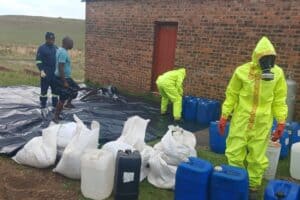Implicated parties cannot simply bare all in front of the commission in order to avoid prosecution as the evidence will be allowed in court through other sources.

The commission of inquiry into state capture may not have any prosecutorial teeth, but it will ensure those guilty of state capture will face the music. It also has some bad news for those hoping for blanket immunity based on their testimony.
Deputy Chief Justice Raymond Zondo yesterday allayed fears that testifying before the commission, which he heads, would enable those implicated in state capture to avoid prosecution.
This follows concerns about a provision in the commission’s terms of reference which states that evidence provided before the commission may not be used against the witness providing it.
Zondo explained that this in no way meant implicated parties could simply bare all in front of the commission in order to avoid prosecution. Similar provisions have been made in other commissions and Zondo said this should not be interpreted as an attempt by former president Jacob Zuma to create a loophole to avoid prosecution.
Legal strategist from Chemaly Incorporated Attorneys Richard Chemaly confirmed Zondo’s statement, explaining that while evidence won’t be allowed to automatically transfer from the commission to a criminal court, it will be allowed to be presented in court through other sources.
“The rationale is similar to that of protection against self-incrimination; to remove barriers of testimony. Only, in this instance, it’s not a matter of a right to refuse to answer a question, but rather to answer a question knowing the answer, in this instance, won’t be used in criminal court,” Chemaly said.
“It does not grant immunity in any way. It merely requires any criminal prosecutors to do more grunt work to get their target. While the difference is subtle, it’s vital to the legal process.”
Zondo also clarified that although the commission itself could not institute criminal proceedings against anyone, he promised it would refer any uncovered transgressions to the prosecutorial authorities.
“Those who would have committed criminal conduct in relation to issues of state capture would need to be dealt with in terms of our criminal justice system,” he said.
The commission will also have the power to deal with anyone who refuses to testify, although Zondo did not indicate how this would be done.
He did, however, indicate that there would be special provisions made for those who have already provided evidence in other forums, related to the current state capture investigations, and who may be prohibited from testifying due to the sub judice principle.
The commission has requested an extension to its timeline.
Also read:
//
For more news your way, follow The Citizen on Facebook and Twitter.






